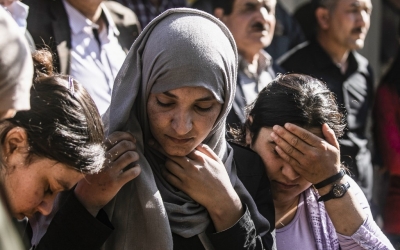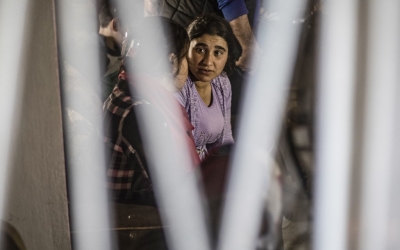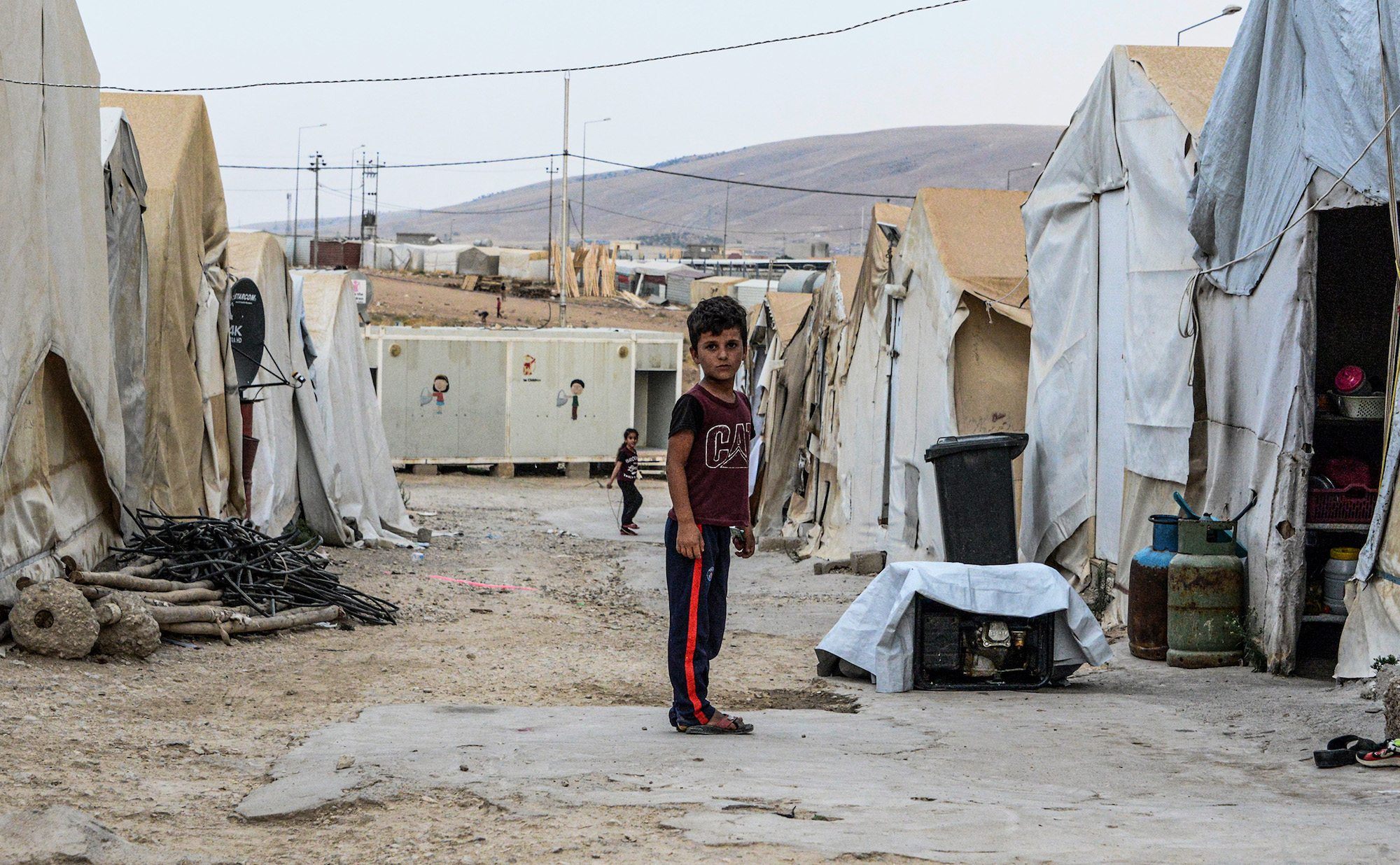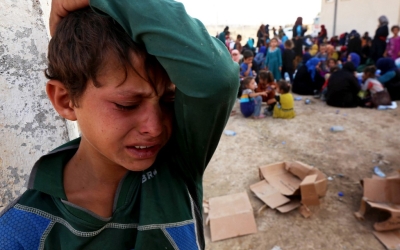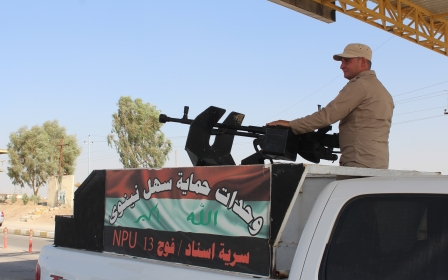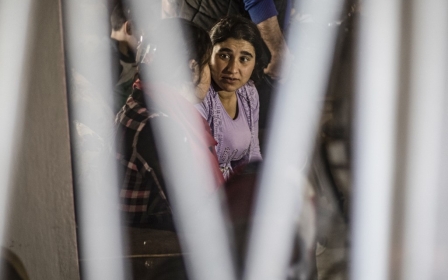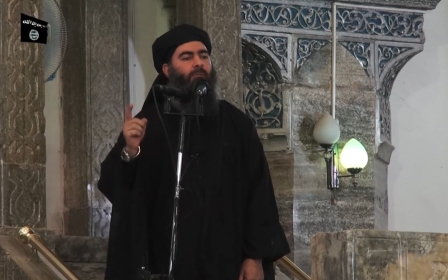Coronavirus in Iraq adds to Yazidi community's trauma
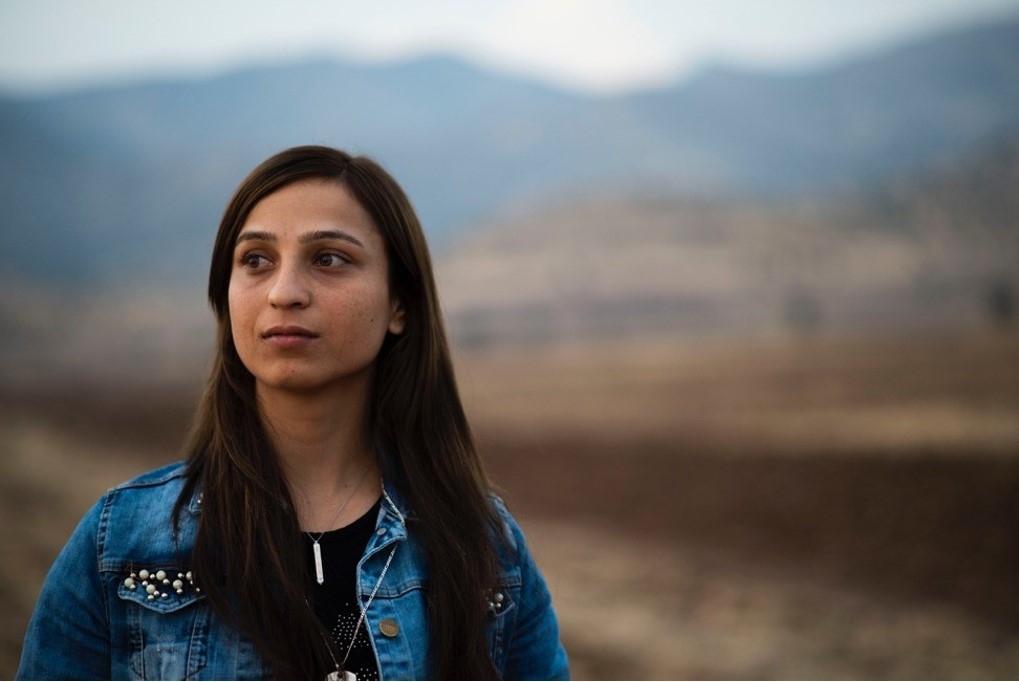
Hala, like many people around the world, is worried about catching Covid-19, the novel coronavirus that has killed more than 300,000 people globally.
But unlike most people, the 24-year-old lives in a tent in Iraq, in an area where medical services are not equipped to battle a deadly virus.
Originally from Sinjar, she was kidnapped by the Islamic State (IS) group and repeatedly sexually assaulted during her three years of abduction. She is one of 350,000 Yazidis who live in IDP (internally displaced persons) camps scattered across the region of Kurdistan in northern Iraq.
Hala says everyone in her camp is worried about being infected with the virus and asks for “more support, more help, and more aid”.
'(My mother) is feeling scared (about Covid-19). She cannot sleep. This doesn’t help her PTSD. IS killed two of her brothers'
- Firas Sulaiman, Yazidi psychologist
Mental health professionals, meanwhile, have warned of the long-term impact that Covid-19 will have on this already traumatised community.
New MEE newsletter: Jerusalem Dispatch
Sign up to get the latest insights and analysis on Israel-Palestine, alongside Turkey Unpacked and other MEE newsletters
This doesn’t surprise Hala, who says the pandemic is affecting the mental health of everyone inside her camp, especially the survivors. They used to be able to get counselling at mental health centres, but those are closed due to the pandemic.
“Now the problem is, where and how will we talk, and to whom will we talk to?” she asked.
In addition to her own mental wellbeing, Hala is also worrying constantly about that of her family. “It is putting serious psychological pressure on me.”
The 'genocide' that never stopped
It’s been almost six years since IS invaded Sinjar on a hot August morning. The Yazidi’s ancestral heartland in northwest Iraq was home to around 400,000 people who lived in villages huddled around the base of Mount Sinjar, which they believe to be sacred.
IS fighters, bolstered by the capture of Mosul and a cache of plundered weapons, massacred 5,000 people and captured around 7,000 women and girls – some as young as eight - who were sold off to be repeatedly sexually assaulted for years. Those who escaped fled to the neighbouring region of Kurdistan. Only around a quarter of the Yazidi population has since returned.
In 2016, the United Nations declared that the atrocities committed against the ethno-religious minority by IS amounted to genocide.
But for many Yazidis, the genocide has never stopped. Around 3,000 people are still missing or held captive by IS, and many Yazidis still haven’t given up hope of reuniting with their missing loved ones.
Even before the coronavirus pandemic, the situation in IDP camps was bleak. Every Yazidi family has at least one person with a psychological disorder – if not all of them, says Firas Sulaiman, who is a psychologist for the Jesuit Refugee Service and leads a mental health programme at a centre outside the Sharia IDP camp.
“Basic needs are not being met. People are living in tents. They’ve lost their dignity. They cannot go back to their homes; all those things increase the number of mental health cases,” he says.
At the moment, the centre has 635 mental health cases, says Sulaiman, and they’ve seen an increase in cases over the last few months due to underlying psychological distress being exacerbated by concerns over Covid-19.
“Living conditions, especially the current living conditions, are very difficult in the camp,” Hala tells Middle East Eye.
“People cannot work - even those who are labourers and daily workers, their work is frozen because of Covid-19.”
According to official figures released by the Iraqi Health Ministry, there are 3,600 confirmed cases of Covid-19 in the country, more than 400 of them in the Kurdistan region. But there are likely many more unconfirmed cases, as testing is not yet widespread.
As of 21 May, five Covid-19 deaths have been recorded in Kurdistan. As the region starts to ease the lockdown, there are concerns that if the virus takes hold in the camps, the spread would be uncontrollable.
Sulaiman is Yazidi and lives inside the camp with his family. His mum has been particularly affected. She has anxiety and experiences psychosomatic pain in her body.
“She’s feeling scared (about Covid-19). She cannot sleep," he explains. "This doesn’t help her PTSD (post-traumatic stress disorder). IS killed two of her brothers.”
Women bear emotional brunt
There has been a sizeable increase in a range of psychological disorders amongst Yazidis since the pandemic began, according to data gathered by Dr Jan Kizilhan, a psychologist and dean of the Institute of Psychotherapy and Psychotraumatology at the University of Duhok.
He has run a study comparing data collected in October 2019 and in April 2020, looking at IDP camps around the province of Duhok.
'Now, 47 percent of females have suicidal thoughts'
- Dr Jan Kizilhan, psychologist
Most significant is the impact the pandemic is having on women: anxiety has increased by 11 percent, while cases of PTSD have increased by 10 percent. The number of people suffering from depression has increased by 6 percent, and suicidal thoughts are becoming more common.
“Before the pandemic, most women said: ‘No, we can control these thoughts, but yes we do have them.’ Now, 47 percent of females have suicidal thoughts,” he says. “(The rate of anxiety) has increased and I am concerned.”
Many of these women have experienced unimaginable brutality at the hands of IS, says Kizilhan. And women who were raped are at a heightened risk, as they struggle to get past the trauma and feel ashamed about their experiences.
Such feelings can be exacerbated by anxieties around Covid-19, such as worries about not being able to access medical support, see a psychologist, and or move around like they used to in order to access essentials like food and water.
The pandemic is not only affecting their recovery, it will likely have long-term consequences on their mental health, he warns.
“I expect 25 percent (of Yazidis) will need psychological support afterwards,” says Kizilhan.
Like Covid-19, these psychological disorders are invisible and deadly. Sulaiman tells MEE that there have been three confirmed suicides committed by Yazidis since the start of the lockdown in March. However, numbers might be higher - as some go unreported due to the stigma around suicide.
“People are not sharing when a suicide has happened, particularly the family will try to keep it a secret and not share it with the Ministry of Health or the hospital,” says Sulaiman.
Kizilhan has a team of psychotherapists on the ground in Kurdistan who treat people in the IDP camps, but at the moment it’s difficult to get access. So they’ve set up weekly phone appointments to keep in touch with patients and find out how they’re doing.
The team has also started making short videos to inform people on things like how to social distance, what to do about sleeping disorders, anxiety, and depression, as well as how to structure their everyday lives.
Looming humanitarian disaster
As the region starts to ease restrictions imposed to curb the spread of coronavirus, Kizilhan is concerned about the possibility of an outbreak in an area without proper medical care.
“It will be a catastrophe. The UNHCR and the Kurdish Government are not able to stop this. We don’t have supplies and we don’t have enough physicians for dealing with Covid-19,” he warns.
With a feeble public health system, a fragile political order, as well as a virus-stricken neighbour - Iran, which has seen more than 120,000 cases of Covid-19 and at least 7,000 related deaths - Iraq is particularly vulnerable to the coronavirus.
In a joint article for Chatham House, experts write that Iraq’s ministry of health is lacking intensive care unit (ICU) beds, human resources, ventilators, and personal protective equipment (PPE).
They say Iraq’s medical institutions are in “dire need of technical and financial support”. And in terms of mental health care for IDPs, Sulaiman says the government is “doing nothing”.
On 16 April, a statement signed by over 30 international NGOs warned of a looming humanitarian disaster in northern Iraq. They called on the WHO to implement a mental health crisis plan, including suicide prevention awareness campaigns, and testing for Covid-19 in all IDP camps. This is yet to happen.
The WHO and the UN Refugee Agency should be scaling up mental health support in the IDP camps, said Ryan D’Souza, a visiting fellow for international peace and security at Oxford University’s Blavatnik School of Government, and executive producer of Nobody’s Listening, a virtual reality experience to memorialise the Yazidi genocide.
“In line with the Responsibility to Protect principle, the UN has a moral obligation to help Yazidi genocide survivors,” D’Souza says.
“UNITAD is doing some important work regarding psychosocial support, including online training for care providers working with Yazidi victims,” he added, referring to the UN investigative team which promotes the accountability for crimes committed by ISIS.
However, he thinks UN humanitarian agencies should be doing a lot more to help Yazidis and other affected communities.
‘Stand by us’
There is also the fear that IS will use the coronavirus pandemic to strengthen their attacks in Iraq.
According to the International Crisis Group, in IS's weekly newsletter Al-Naba (the Dispatch), IS called on its fighters to use the pandemic to their advantage and attack its enemies while they are distracted by Covid-19.
The past month has seen a flurry of aggressive activity by the militant organisation, while coalition forces - including the UK - have temporarily withdrawn some of their troops from the country to prevent the spread of the virus.
It is not good news for the hundreds of thousands of Yazidis, including Hala, who wish to return home to Sinjar.
“My hope for the future is to have safety and security for the Yazidi people… and for IS fighters to be punished,” she says.
To help achieve this, Hala recently joined the Yazidi Survivors Network (YSN) set up by Yazda, a Yazidi global NGO. Along with 14 other survivors, she was trained on topics such as criminal justice, truth-seeking and reparation.
“It’s a platform where they can support and motivate each other to stand strong and demand their basic human rights,” says Natia Navrouzov, an international lawyer who is heading Yazda’s documentation project and gave the training.
There was a momentary glimpse of hope at the end of April, when a suspected member of IS went on trial in Germany accused of genocide, human trafficking, and murdering a Yazidi girl who he kept hostage.
The trial of the 27-year-old Iraqi man is believed to be the first in the world that carries the charge of genocide in relation to the Yazidis, although proving before a court that genocide has taken place is difficult. The outcome will not be known until at least August.
Kizilhan says that getting justice is an important part of the healing process for the persecuted minority.
“If you don’t have any justice, how can you have any idea of peace or reconciliation?”
Furthermore, he says it will help them move on from the past and look to the future.
For Hala, awareness of the Yazidis’ plight is crucial: “I want the international community to hear our voices, and stand by us.”
Middle East Eye delivers independent and unrivalled coverage and analysis of the Middle East, North Africa and beyond. To learn more about republishing this content and the associated fees, please fill out this form. More about MEE can be found here.


